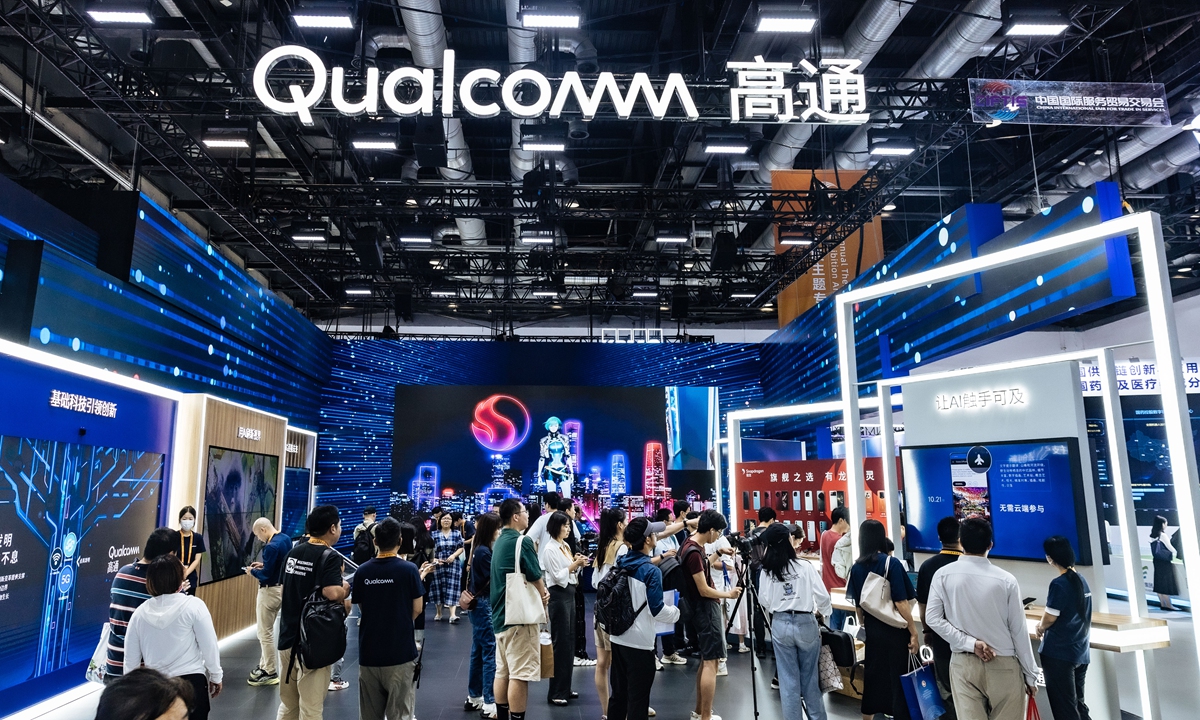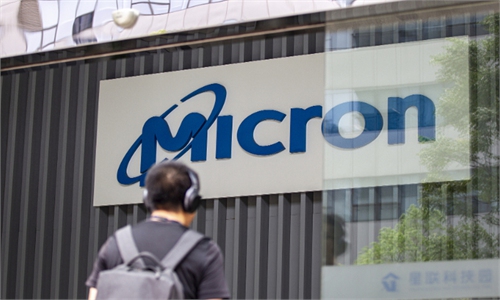
Visitors tour the booth of the US chip company Qualcomm at the 2023 China International Fair for Trade in Services (CIFTIS), which runs from September 2 to 6 in Beijing. This year is the fourth consecutive year that the US tech company is participating in the fair. Photo: Li Hao/GT
Qualcomm is cutting more than 1,000 jobs in the US due to uncertainty in the economic and demand environment. The latest layoffs, following recent adjustments in its office in Shanghai, show that attempts by the US to suppress China's tech industry have backfired and hurt the US semiconductor firms, experts said.
The US chip giant is cutting at least 1,258 jobs in two of its California offices, according to filings with the California Employment Development Department, which would represent about 2.5 percent of its total workforce, CNBC reported.
According to CNBC, the company pointed to the layoffs in its quarterly earnings report, in which it noted that it was expecting workplace reductions and related restructuring charges.
"Given the continued uncertainty in the macroeconomic and demand environment, we expect to take additional restructuring actions to enable continued investments in key growth and diversification opportunities…we currently expect these actions to consist largely of workforce reductions," according to the earnings report.
The US chip giant in September denied rumors that the Shanghai branch was preparing large-scale layoffs, but admitted there may be some layoffs due to "uncertainties" in the demand situation.
The recent adjustments show that Qualcomm sees significant pressure in its development, particularly in light of the breakthrough by Huawei, offering clear evidence that the suppression by the US of Chinese companies has backfired, Xiang Ligang, a veteran telecom observer, told the Global Times on Sunday.
The Chinese market is crucial for Qualcomm, as part of its revenue comes from selling chips to Chinese companies, including Huawei. Yet Huawei's strong high-profile comeback with the launch of all-scenario products amid reported chip breakthroughs means that it has further reduced its reliance on Qualcomm, Xiang said.
"Huawei has successfully developed its own smart chips, meaning that there is no need to purchase chips from Qualcomm. Additionally, Huawei's re-entry into the high-end market in China has had an impact on companies like Xiaomi and OPPO. This will indirectly affect Qualcomm's market share among other customers," Xiang explained.
Rumors circulating online suggest that Huawei's Mate 60 series uses the self-developed Kirin 9000S chip instead of Qualcomm's chip, marking a significant breakthrough in breaking the blockade by the US.
According to a forecast by TF International analyst Ming-Chi Kuo, starting from 2024, Huawei will cease purchasing Qualcomm chips, and new models will fully adopt their in-house Kirin chips.
For the quarter ended June 2023, Qualcomm reported revenue of $8.45 billion, down 22.7 percent over the same period last year.
The decoupling of US technology and the suppression of China's semiconductor industry has backfired on the US and also its allies.
As Chinese companies make steady breakthroughs, the US has been forced to grant indefinite waivers for South Korean chipmakers Samsung Electronics and SK Hynix to supply US chip gear to their factories in China after relevant bans have seriously disrupted the global supply chain.
Chinese Foreign Ministry spokesperson Wang Wenbin said on Friday that China opposes US politicizing, instrumentalizing and weaponizing trade and tech issues, in response to media reports that the US is considering stepping up chip export controls on China.
One of the new policies will restrict Chinese companies' access to US artificial intelligence chips via overseas units, Reuters reported.
Arbitrarily imposing curbs or forcibly seeking decoupling to serve a political agenda violates the principles of the market economy and fair competition, undermines the international economic and trading order, disrupts and destabilizes global industrial and supply chains, and will eventually hurt the interests of the whole world, Wang said.



